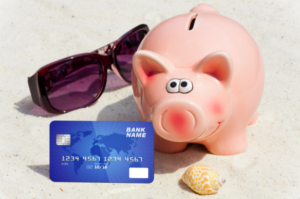
Prepaid travel cards are a good way of keeping track of your holiday spending as you can only spend the amount that has been loaded onto the card. When you reach the limit, you can simply add more money to the card. They also provide a cost-effective and relatively safe way to take money abroad as the card can be blocked if lost or stolen.
In this article, we share some of the best prepaid travel cards for travelling abroad and explain the pros and cons of using one. We also compare prepaid travel cards to alternative ways of spending money abroad such as app-only banks.
Download the Revolut app for free
Sign-up to Revolut & get a free card with your Revolut Standard account (delivery fees apply)
- Exchange up to £1000/month with no additional fees charged by Revolut (Monday to Friday)
- Withdraw up to £200 or 5 ATM withdrawals per rolling month, with no withdrawal fees charged by Revolut
- Send money in 29+ currencies

Best prepaid travel cards
In the table below, we summarise the best prepaid travel cards based on the fees they charge, the maximum and minimum amount you can load on the card and what each card is good for.
| Wise* | Zing* | Caxton Currency Card | FairFX Currency Card | Post Office Travel Money Card | Revolut Standard | Travelex Currency Card | |
| Set up fee | Free (£7 fee for physical card) | Free | Free | Free | Free | Free | Free |
| Loading fee | Up to 2% but varies on transaction type | Free | Free | Free | 1.5% applicable to GBP top ups. (Min. charge of £3 and a max. charge of £50) | Free | 2% applicable to GBP top ups. No fee on topping up foreign currency wallets. |
| Fee-free spending abroad | Free if you hold the currency within your Wise account, otherwise fee varies by currency, from 0.33% | Free if you hold the currency within your Zing wallet, otherwise fee varies by destination (viewable in app or on website) | Free in the currencies held on the card, 2.49% in any other currency | Free in the currencies held on the card, 2.25% in any other currency | Free in the currencies held on the card, 3% in any other currency | Free up to £1,000 per month, 1% fee thereafter (plan dependent) | Free in currencies on the card, 5.75% on a currency not on the card |
| Fee-free ATM withdrawals abroad | 2 free withdrawals per month (up to £200), 50p per withdrawal and 1.75% fee thereafter | 1 free withdrawal per month, £2 per withdrawal thereafter | Free in the currencies held on the card, 2.49% in any other currency | £1 fee | Fees vary per currency (e.g. €2 or $2.50) | 5 free withdrawals a month (up to £200), 2% fee thereafter | Yes |
| ATM withdrawal limit | £4,000 monthly | £500 daily | £300 daily (2 max withdrawals a day) | £2,000 daily | £300 daily | £3,000 daily (but £200 is fee-free) | £500 daily |
| Minimum top up balance | No min. | No min. | £50 | No min. | £50 | £10 | £50 |
| Maximum balance on card | Varies | £40,000 per currency | £12,000 | Varies | £10,000 | Varies | £5,000 |
| Currencies held on the card | 40+ | 20+ | 15 | 20 | 22 | 36 | 22 |
| Monthly inactivity fee | No fee | No fee | £2 | £2 | £2 | No fee | £2 |
| Good for... | Sending money abroad | Holding lots of currencies | Holding extra currencies | Cashback | Managing card in travel app | Storing money in Sterling | Fee-free ATM withdrawals abroad |
| Find out more... | Wise | Zing | Caxton Currency Card | FairFX Currency Card | Post Office Travel Money Card | Revolut review | Travelex Currency Card |
What type of prepaid travel card should you get?
Choosing the right prepaid travel card will largely depend on how you are planning to use it. You can expect to pay fees for various features of the card, including loading money on the card, making transactions, withdrawing cash or simply keeping the card active. We explain the fees in more detail later in the article.
Apart from cost, the main consideration is whether to get a card that offers a single currency - say, euros or dollars - or a multi-currency option. Alternatively, you may prefer a card that can store money in Sterling, which can be used more widely, including on your return to the UK.
Single-currency prepaid travel cards
If you are going to just one destination or are, for example, travelling around a few European countries that all accept Euros, it can be simpler to opt for a prepaid travel card in just one currency. When you load money onto the card, it will automatically be converted into that currency and it is easy to keep track of your balance as it will also be displayed in that currency. The exchange rate you receive will be the one at the time you load the money on the card.
Another key advantage of single-currency cards is they are usually free, although some require a minimum initial amount to be loaded on the card. The main drawback is you won't be able to use it in countries with other currencies and may have to pay a fee to transfer any remaining balance back to your bank account.
Multi-currency prepaid travel cards
As the name suggests, these cards allow you to have different currencies on one card. This is handy if you want to use the card for multiple trips or if you are visiting several countries during one holiday. It also means you can either choose to lock in an exchange rate when you load a particular currency or, instead, keep some of the money in sterling and transfer it into another currency later down the line. It is worth noting that you could face an additional 2% fee for converting money on the card from Sterling into another currency depending on the terms and conditions of the card.
Some cards can hold a number of different currencies, with the individual balances in each one kept separate and viewed easily. However, you need to keep in mind that the card will limit the maximum amount you can load on it, so you may want to consider how much you are likely to want to spend in each currency before loading to avoid having to pay additional top-up fees later down the line.
Sterling prepaid travel cards
Another option is a card that you top up with Sterling and then opting to pay in local currency with each purchase when you are abroad. These cards offer travellers the greatest degree of flexibility and can also be used in the UK. However, there is less certainty on the exchange rate you will get as it will be calculated each time you use the card and will therefore be subject to daily fluctuations. This can make budgeting more challenging.
How much does a prepaid travel card cost?
- Cost of buying the card - Many cards are free to purchase when you load the card with a minimum initial amount. Others may charge an initial fee to take out the card.
- Monthly fee - As with the initial set-up fee, some cards require cardholders to pay a monthly fee to keep the card active. This could be as little as £1 per month but could be as high as £10. It is worth checking in advance what happens to any balance remaining on the card if you don't keep up with these monthly payments.
- Using the card - Again, while it's not the case with all prepaid travel cards, some will charge a small transaction fee for every purchase on the card. There may also be a similar fee for withdrawing money on the card from an ATM, either when you're abroad or back in the UK.
- Topping up the card - You could face a fee of 2% to 3% to top up the card. This charge tends to be levied on cards where there aren't transaction fees for using the card or withdrawing money on the card.
- Replacing lost or stolen cards or cancelling the card - You may have to make a one-off payment to replace the card if it is lost or stolen. Similarly, you may have to pay to cancel the card and transfer any remaining balance back to your bank account.
What exchange rate will I get on my prepaid travel card?
Locking in the best exchange rate can make a huge difference in how far your money will stretch during your time abroad. For most prepaid travel cards, the exchange rate will be set by either the card network - Visa or Mastercard - or an interbank exchange rate, which all tend to be the most competitive rates on the market. The card provider will then typically add commission on top of that.
You can find the Visa and Mastercard exchange rates on their websites. It is more important to check the terms and conditions of the individual card to see what level of fees or commission they charge on top of this standard rate.
Advantages and disadvantages of prepaid travel cards
What are the advantages of prepaid travel cards?
- Safer than cash - Using a prepaid travel card is generally safer than carrying the equivalent amount in cash as, if it's stolen, you can cancel the card and stand a better chance of being able to get back the remaining balance on the card. You will often also be issued with a replacement card.
- Helps to budget - These cards allow you to budget easily as the amount you spend is limited by the total you have loaded on the card. There is also no potential to become overdrawn as they aren't linked to your bank account. The exchange rate is determined at the point you put money on the card, so it also removes that uncertainty if there are fluctuations.
- No credit check required - You don't need to have a credit check to get a prepaid travel card, unlike a travel credit card. This means it is a good option if you have a thin credit file or have an impaired credit score.
- Good for children - It is a way for parents to give their teenage children spending money for their first solo holidays, with the ability to top up the balance if there is an emergency.
What are the disadvantages of prepaid travel cards?
- Fees - As we've outlined above, there are fees associated with prepaid travel cards, which is how the card companies make money. Depending on what the fee structure is, it could work out cheaper to opt for a specific travel credit card.
- May not be accepted everywhere you go - Although they are widely accepted, there may be some retailers who won't accept them and only take cash.
- No Section 75 protection - Unlike credit cards, prepaid cards aren't covered by Section 75 of the Consumer Credit Act, which gives protection for purchases between £100 and £30,000. This is explained in more detail in our article "Section 75 of the Consumer Credit Act explained - your rights and how to claim".
What are the alternatives to prepaid travel cards?
An option that may work out cheaper for frequent travellers is a dedicated travel credit card. As the name suggests, these cards are designed with deals aimed specifically with foreign usage in mind, with many offering airmiles, no foreign transaction fees, free ATM withdrawals and competitive exchange rates. For a full rundown of the best cards available, read our article "Compare the best travel credit cards".
A number of high street banks have started to offer fee-free spending abroad, however, if your bank doesn't offer this or you want to separate your holiday spending from your main current account, you may want to use an app-only bank such as Monzo, Starling or Chase Bank. If you bank with any of these you can spend money abroad with no additional foreign transaction fees and withdraw money abroad at no extra cost, although some limits may apply. For more information on these app-only banks, read our reviews:
If a link has an * beside it this means that it is an affiliated link. If you go via the link, Money to the Masses may receive a small fee which helps keep Money to the Masses free to use. The following link can be used if you do not wish to help Money to the Masses or take advantage of any exclusive offers - Wise, Zing






